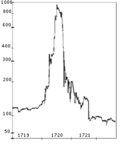Portal:Business
The Business and Economics Portal  Business is the practice of making one's living or making money by producing or buying and selling products (such as goods and services). It is also "any activity or enterprise entered into for profit." A business entity is not necessarily separate from the owner and the creditors can hold the owner liable for debts the business has acquired. The taxation system for businesses is different from that of the corporates. A business structure does not allow for corporate tax rates. The proprietor is personally taxed on all income from the business. A distinction is made in law and public offices between the term business and a company such as a corporation or cooperative. Colloquially, the terms are used interchangeably. (Full article...) Economics (/ˌɛkəˈnɒmɪks, ˌiːkə-/) is a social science that studies the production, distribution, and consumption of goods and services. Economics focuses on the behaviour and interactions of economic agents and how economies work. Microeconomics analyses what is viewed as basic elements within economies, including individual agents and markets, their interactions, and the outcomes of interactions. Individual agents may include, for example, households, firms, buyers, and sellers. Macroeconomics analyses economies as systems where production, distribution, consumption, savings, and investment expenditure interact; and the factors of production affecting them, such as: labour, capital, land, and enterprise, inflation, economic growth, and public policies that impact these elements. It also seeks to analyse and describe the global economy. (Full article...) Selected articleThe United States Assay Commission were an agency of the United States government from 1792 to 1980. Its function was to supervise the annual testing of the gold, silver, and (in its final years) base metal coins produced by the United States Mint to ensure that they met specifications. Although some members were designated by statute, for the most part the commission, which was freshly appointed each year, consisted of prominent Americans, including numismatists. Appointment to the Assay Commission was eagerly sought after, in part because commissioners received a commemorative medal. These medals, different each year, are extremely rare, with the exception of the 1977 issue, which was sold to the general public. The Mint Act of 1792 authorized the Assay Commission. Beginning in 1797, it met in most years at the Philadelphia Mint. Each year, the President of the United States appointed unpaid members, who would gather in Philadelphia to ensure the weight and fineness of silver and gold coins issued the previous year were to specifications. In 1971, the commission met, but for the first time had no gold or silver to test, with the end of silver coinage. Beginning in 1977, President Jimmy Carter appointed no members of the public to the commission, and in 1980, he signed legislation abolishing it. Selected image
Selected economyThe economy of Zimbabwe is a gold standard based economy. Zimbabwe has a $44 billion dollar informal economy in PPP terms which translates to 64.1% of the total economy. Agriculture and mining largely contribute to exports. The economy is estimated to be at $73 billion at the end of 2023. The country has reserves of metallurgical-grade chromite. Other commercial mineral deposits include coal, asbestos, copper, nickel, gold, platinum and iron ore. (Full article...) Selected quote"Gresham's law has made a modified reappearance. For most cars traded will be the "lemon", and good cars may not be traded at all. The"bad" cars tend to drive out the good (in much the same way that bad money drives out the good). But the analogy with Gresham's law is not quite complete: bad cars drive out the good because they sell at the same price as good can; similarly, bad money drives out good because the exchange rate is even. But the bad cars sell at the same price as good cars since it is impossible for a buyer to tell the difference between a good and a bad car; only the seller knows. In Gresham's law, however, presumably both buyer and seller can tell the difference between good and bad money. So the analogy is instructive, but not complete."
TopicsRelated WikiProjectsDid you know (auto-generated) -
On this day in business history
General imagesThe following are images from various business-related articles on Wikipedia.
More did you know
Business news
SubcategoriesRelated portals
Things you can doUrgent and important articles are bold
WikimediaThe following Wikimedia Foundation sister projects provide more on this subject:
SourcesDiscover Wikipedia using portals |










































